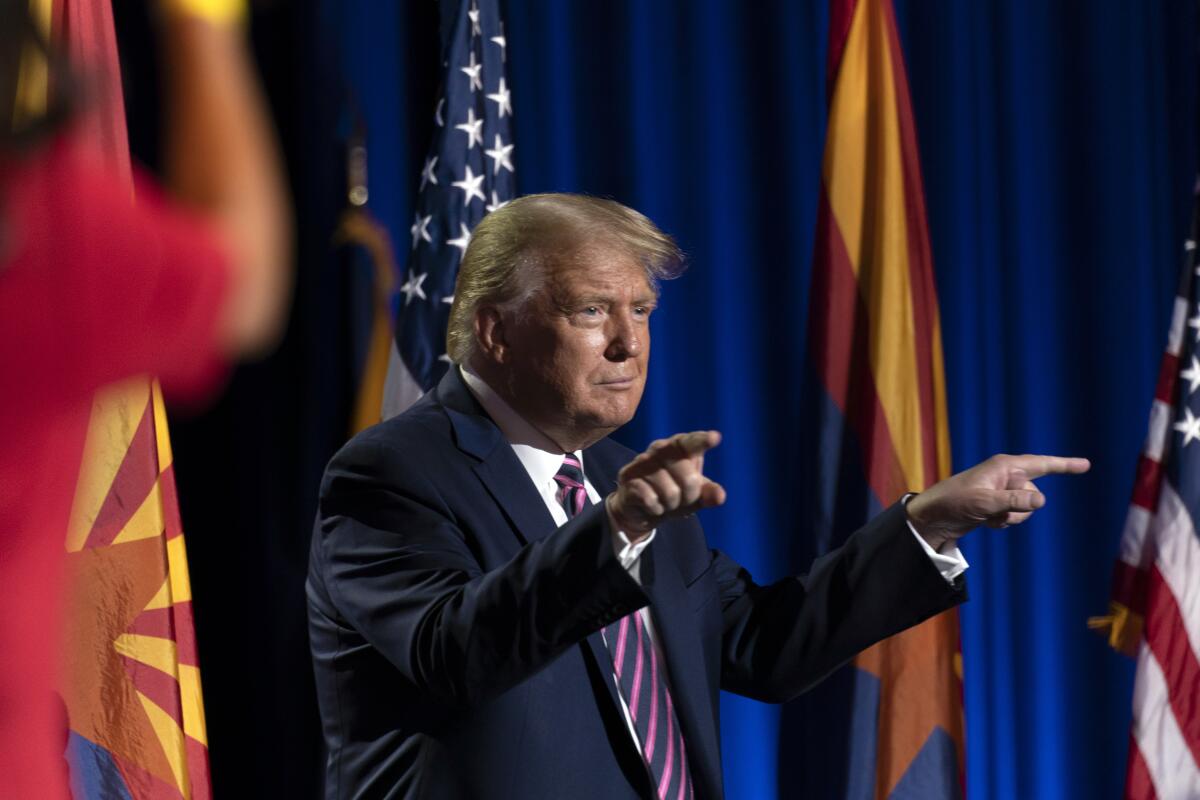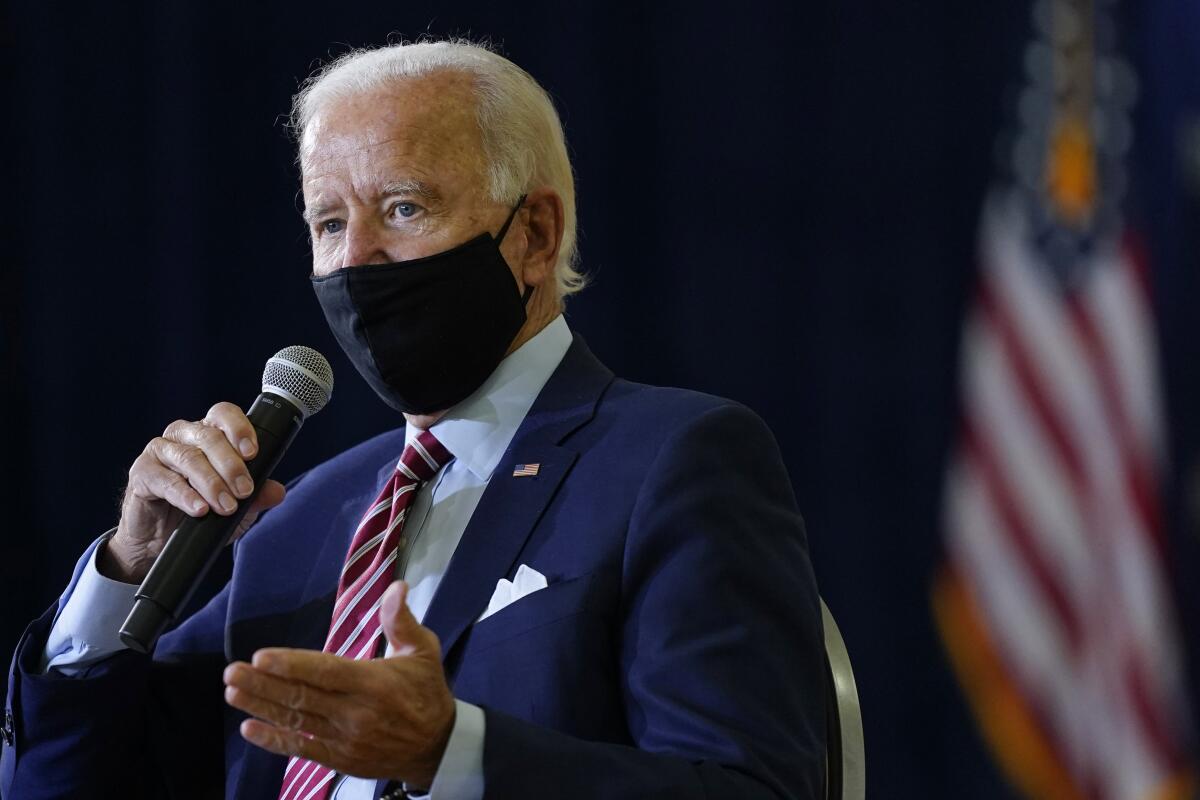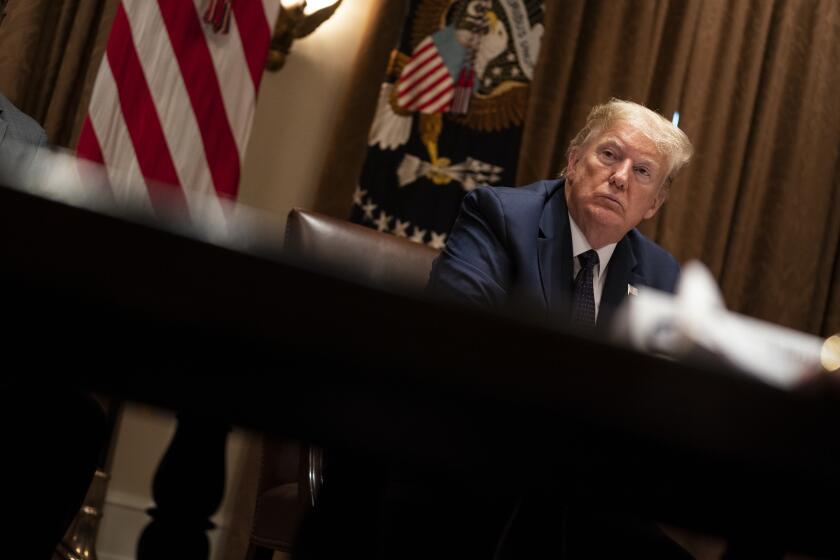Trump aims lower with a sordid attack on Biden

- Share via
WASHINGTON — President Trump opened a sordid new chapter Tuesday in America’s history of ugly political rhetoric, sharing a tweet that falsely suggests Democratic nominee Joe Biden is a pedophile.
Presidential campaigns long have trafficked in lurid accusations of extramarital affairs, drunkenness and corrupt behavior. But Trump has aimed lower, personally tapping baseless conspiracy theories to smear his opponent.
The latest outrage arrived in the retweet of an anonymous account that was suddenly granted presidential amplification seven weeks before the election.
Someone using the name “Conservative Girl” posted a video clip under the hashtag “PedoBiden.” It showed then-Vice President Biden placing his hands on the shoulder of a woman and whispering to her during the swearing-in ceremony for her husband, Ash Carter, as Defense secretary in February 2015.
Stephanie Carter defended Biden when the photo became a meme, praising him as “a close friend helping someone get through a big day, for which I will always be grateful.”
The president’s suggestion of child sex abuse echoes the ravings of QAnon, the internet conspiracy theory that falsely claims the president is battling a secret cabal of Democratic pedophiles. The president thanked QAnon last month, saying, “I understand they like me very much, which I appreciate.”
Since taking office, Trump has voiced thousands of falsehoods and insults to provoke the media and excite his fans. He’s gambling now that his harsh rhetoric about Biden will create doubts for undecided voters and light a spark under supporters who might not vote.
In recent days, he has accused Biden of being mentally “shot” and “on drugs,” and implied that the 77-year-old will not be fit to serve within a month of taking office. Trump is 74.
The president blames Democrats for the escalation. Over the weekend, he complained bitterly about a Biden campaign ad that focused on Trump’s reported remarks that U.S. soldiers buried in France were “losers” and “suckers.”
“Pathetic Joe, he’s a pathetic human being to allow that to happen,” Trump told a rally Saturday in Henderson, Nev. “Now I can be really vicious.”

Analysts say the mudslinging may be the worst in U.S. history.
“There are aggressive campaigns. There are nasty campaigns,” said Julian Zelizer, a presidential historian at Princeton University. “But when the president starts tweeting like this, it’s as low as you can go.”
Some of Trump’s attacks are recycled from 2016, when he questioned Hillary Clinton’s health, said she should be imprisoned and demanded she take a drug test before their debates. The relentless attacks helped undermine her campaign.
“This is a campaign from the very beginning that has struggled to define Joe Biden in the way that they did Hillary Clinton,” said Amy Walter, a political analyst from Cook Political Report. “It’s not working this year.”
With Biden leading in the polls, and voters increasingly skeptical of Trump’s handling of the COVID-19 pandemic, which has killed more than 195,000 Americans in six months, Trump has sought to convince voters that Biden poses a bigger danger.
“He cannot afford this race to be a referendum on himself,” Walter said. “But he cannot help himself.”
Insults are trickier for Biden, whose campaign is based in part on his claims to decency and empathy.
Still, he called the president a “climate arsonist” on Monday for failing to address global warming as wildfires rage across California and Oregon. His campaign manager on Tuesday blasted Trump’s crowded indoor campaign rallies in a pandemic, saying “people will die because of these types of events.”
Sometimes Biden’s most alarming claims have proved accurate. He drew sharp criticism in April, for example, by speculating that Trump would try to delay the Nov. 3 election. Three months later, Trump suggested doing exactly that, although he has no authority to order a delay.
A spokesman for Trump’s campaign did not respond to questions Tuesday.
In recent days, Trump fired another inspector general, attacked a federal judge, demeaned a whistle-blower, and slammed reporters who check his facts and performance. Instead of presidential leadership during a crisis, critics saw a deliberate campaign of disinformation and distraction.
Political name-calling is almost as old as the republic. The country’s first political sex scandal exploded in 1797 when Alexander Hamilton, the first secretary of the Treasury, was blackmailed over an extramarital affair. Hamilton eventually revealed his affair as he fought corruption allegations.
During the 1868 campaign, newspapers called Ulysses S. Grant, the general who led the Union to victory in the Civil War, “brainless as his saddle,” a “man of vile habits” and a “drunkard.” He was elected twice.
In the 1884 race, Grover Cleveland faced accusations that he fathered a child with a woman who wasn’t his wife.
“Ma, Ma, where’s my Pa?” his critics sneered. After Cleveland won, his supporters responded with a taunt of their own — “Gone to the White House, ha, ha, ha!”
But presidential candidates usually have outsourced the dirty work to surrogates and aides, preferring to appear unsullied.
Trump seems to relish the task. He was a leading proponent of the racist falsehood that President Obama wasn’t born in the United States and therefore ineligible to serve as commander in chief.
When Trump launched his 2016 campaign, he caught his Republican rivals off guard with a blizzard of insulting nicknames — “Lyin’ Ted Cruz,” “Low Energy Jeb Bush,” “Little Marco Rubio” — and outlandish claims of wrongdoing by his opponents.
“Trump takes these elements of our politics and he just accelerates them. He puts them on steroids,” Zelizer said. “It’s very hard to get back from that.”
More to Read
Get the L.A. Times Politics newsletter
Deeply reported insights into legislation, politics and policy from Sacramento, Washington and beyond. In your inbox three times per week.
You may occasionally receive promotional content from the Los Angeles Times.












